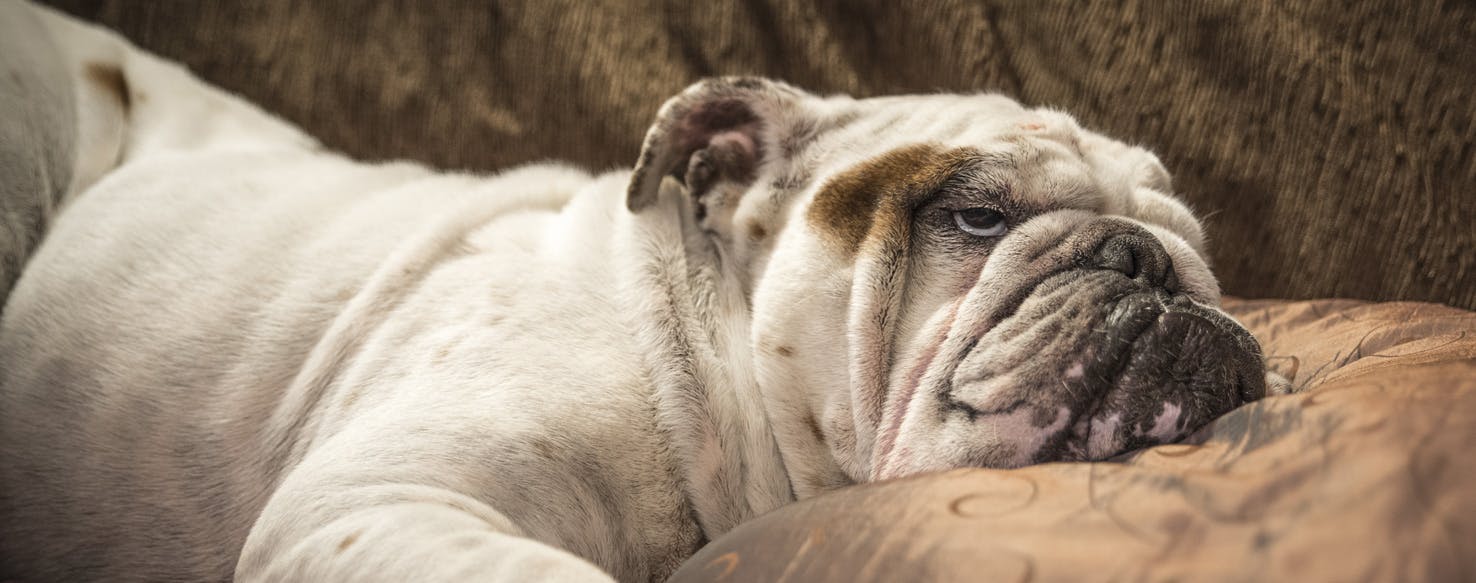
Save on pet insurance for your pet
You don't have to choose between your pet and your wallet when it comes to expensive vet visits. Prepare ahead of time for unexpected vet bills by finding the pawfect pet insurance.
For some, dogs and snoring often go hand-in-hand. During the daytime or all night long when you are trying to get your own sleep, you may have to listen to your dog sawing logs. Many dogs snore.
Is There More to the Snore?
Though we often find it funny to hear when we are wide awake and our dogs are sleeping, it's not so fun to listen to in the middle of the night when we are trying to catch up on our own beauty rest. Besides being an annoyance, snoring can also be a sign of some health problems for your dog. There are some ways prevent snoring for some dogs, so maybe you can get some sleep too.
Airway
Dogs, much like people, typically snore for specific reasons. Snoring is often caused by a blockage of the dog’s airway. By observing your dog’s sleeping position, you might be able to tell whether his airway is obstructed causing annoying nights filled with sounds of snoring. Dogs, much like people, like to sleep on their backs. This may mean, for your dog, snoring is inevitable as his tongue rolls back into his throat, blocking the air passage. However, there may be some other reasons your dog is snoring and some ways to prevent it. If your dog is snoring simply because he is in a sleeping position that obstructs his airway, such as lying on his back, you may be able to roll him into a different position to stop the snoring. However, it's not always easy to train your dog to sleep in a position that will prevent the snoring from occurring in the first place. But there are some tricks to set him up in a sleeping position that may prevent snoring. Give your dog an extra pillow and encourage him to sleep with his head up on a pillow raised above his chest. If your dog uses a dog bed, give him a bed that is round in shape with raised sides to support a curled-up position which will help to expand his airways. A more comfortable sleep for your dog may also decrease and prevent snoring. Try to keep your dog’s sleeping area cool and comfortable. If you are in a dry area or are using your heater, causing the air to dry out, your dog may sleep more comfortably with a humidifier. Dry air can dry out his air passages causing snoring as well.
Allergies
Dogs deal with allergies just as people do. There's always a chance there are allergens in your dog’s sleeping areas. When your dog goes outside to play or to eliminate, she may bring allergens into your house as well as into her bedding. Be sure to keep her sleeping area clean and bedding washed, dusted, or vacuumed on a regular basis to keep those allergen levels low in her spaces. You may want to start a cleaning process with the onset of each new allergy season. For instance, before spring starts, do a thorough spring cleaning before the pollen levels become high and maintain a higher level of cleaning for your dog’s bedding and sleeping areas to prevent snoring as a result of allergens while your dog sleeps. Other allergens in your home such a cigarette smoke could be bothering your dog as well.
Blockage
If your dog’s snoring is relatively new, there is always a chance he has inhaled a foreign object causing issues with his breathing passages. Snoring could also be an indicator of a blockage in air passages, such as tumors. So, an older dog who does not have a history of incessant snoring might need to be checked out by your veterinarian, not only to prevent snoring in the future, but also to rule out any serious medical issues. Having your dog, at any age, thoroughly checked for underlying medical issues could certainly prevent snoring in the future.
Better Sleep for Everyone
Giving your dog comfortable bedding and areas to sleep, whether he is napping throughout the day or sleeping at night, can help prevent snoring for your dog. This can give him a better night's rest, but also help with your sleep as well. Imagine giving up the sleepless nights you have had listening to your dog snore by making simple preventive measures such as changing their bedding, lifting their head with an extra pillow, or giving them a bed which causes them to sleep in a different position. Ridding your home of allergens such as pollen and cigarette smoke can be healthy for your entire family, too. Second-hand smoke not only affects people, but it also affects our pets as well. Quitting smoking and cleaning your home from the smell of smoke that is in your curtains, fabric, and furniture can be healthy for everyone who comes into your home.
Simple Steps to Stop the Snore
Nobody likes the annoyance of a snoring dog. Some dogs who snore are genetically susceptible to snoring simply because of the way their faces are built, with short snouts and smooshed faces. These breeds are especially known for snoring, but can be helped as well as other breeds with some simple preventive measures in their sleeping spaces as well as throughout your home. Start with simple steps to get a good night’s sleep for both you and your dog and follow up with your veterinarian to ensure your dog’s snoring is not caused by something medically related.
You may also like
